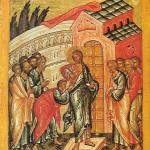Chapter 3 observed the way in which Balaam, a Mesopotamian diviner, was somewhat unfairly vilified in the NT. In the full story about him (Num. 22:1-24: 25), he clearly exemplifies how an ‘outsider’, who never joins the people of God, can pronounce genuine prophecies about the destiny of Israel, its royal leader, and Jesus himself. Could we imagine such prophetic activity continuing today among those who do not belong to the Church?
One might readily think here of ‘positive’ figures such as Martin Buber (1879 – 1965), Mahatma Gandhi (1869 – 1948), and the Dalai Lama (b. 1936). But what of such notoriously ‘negative’ figures as Sigmund Freud (1856 – 1939), Karl Marx (1818 – 83), and Friedrich Nietzsche (1844 – 1900). Marold Westphal entertained the possibility in his Suspicion and Faith: The Religious Use of Modern Atheism. Westphal explored brilliantly the abiding challenges that Freud, Marx and Nietzsche pose to believers, who slide into various forms of self-deception. Without changing anything, he might have given his book another subtitle: The Prophetic Use of Modern Atheism. What would it be like to take the case of Balaam as an encouragement to look for prophetic figures, both positive and negative, in the modern world? St Augustine of Hippo (354 – 430) recognized the presence not only of ‘hidden saints’ but also ‘prophets’ among the Gentiles (Contra Faustum 19.2; De catechizandis rudibus 22.40). He declared roundly that ‘prophecy was extended to all nations (omnibus gentibus dispensabatur prophetia)’ (In Ioanem 9.9).
Gerald O’Collins, S.J. Salvation For All: God’s Other Peoples (Oxford: Oxford University Press, 2008), 203-4.
















